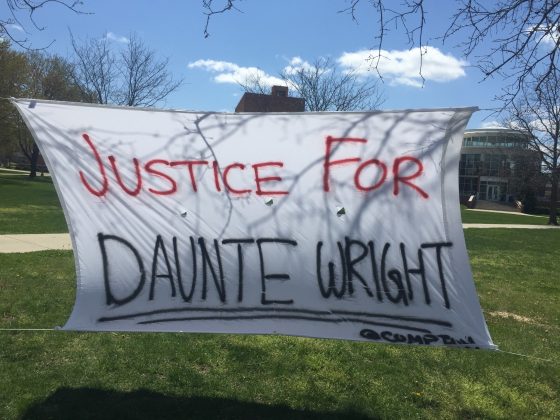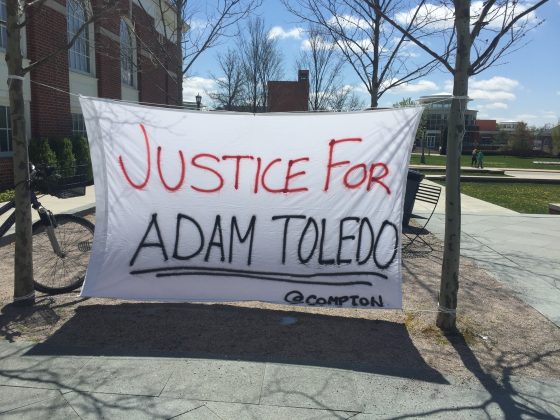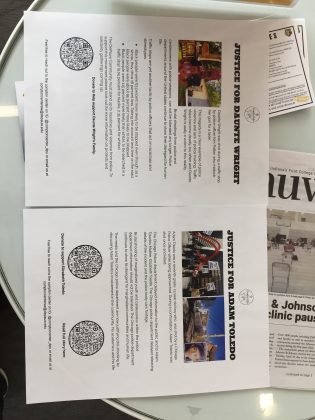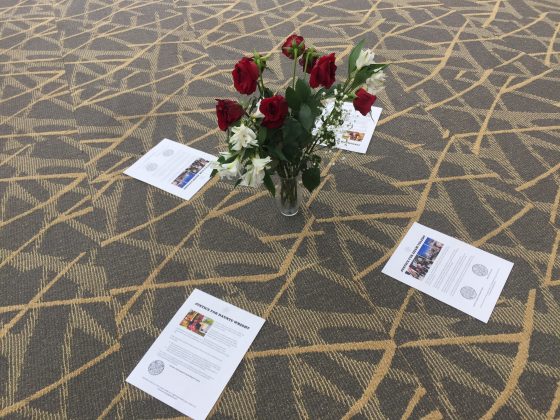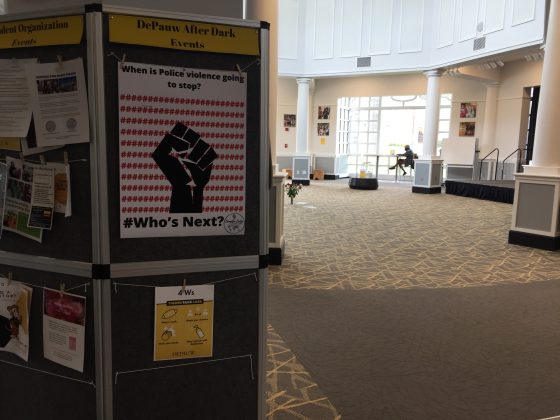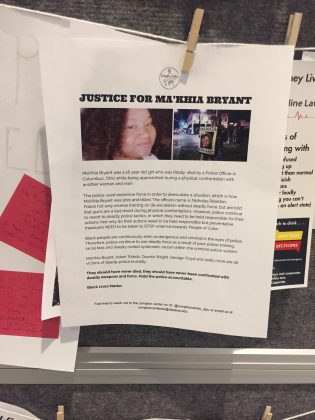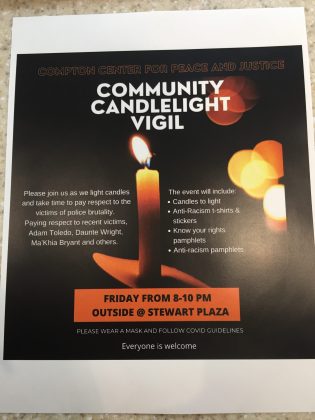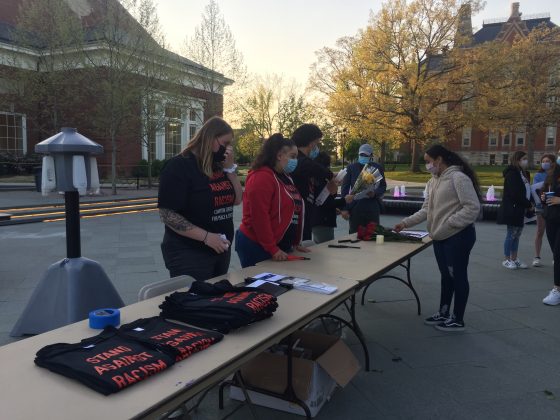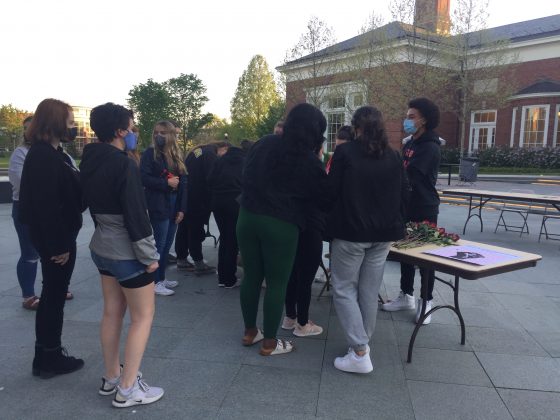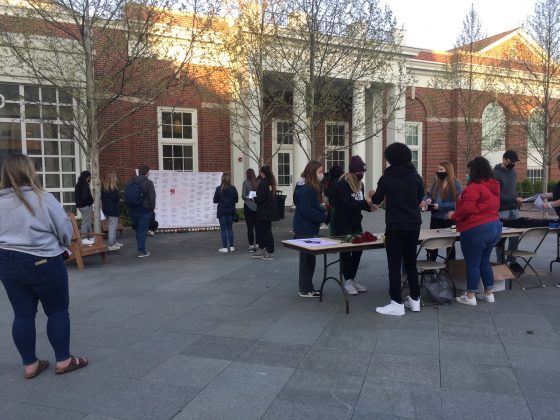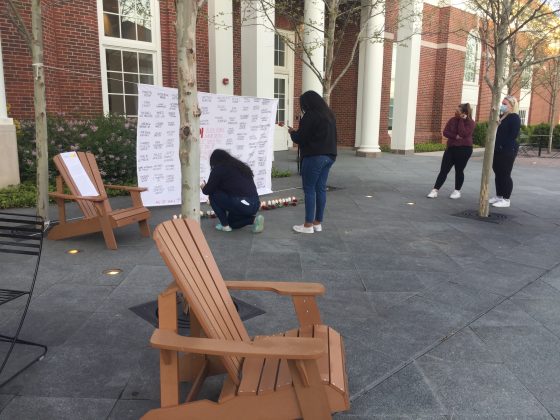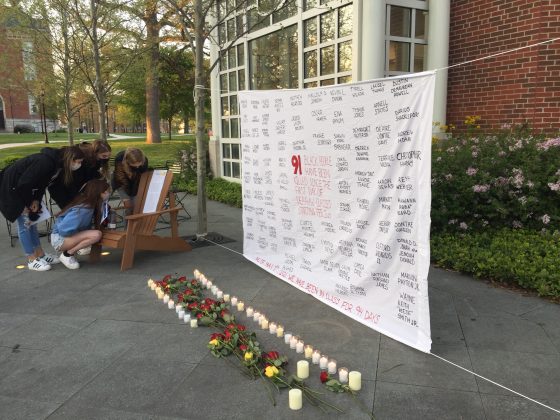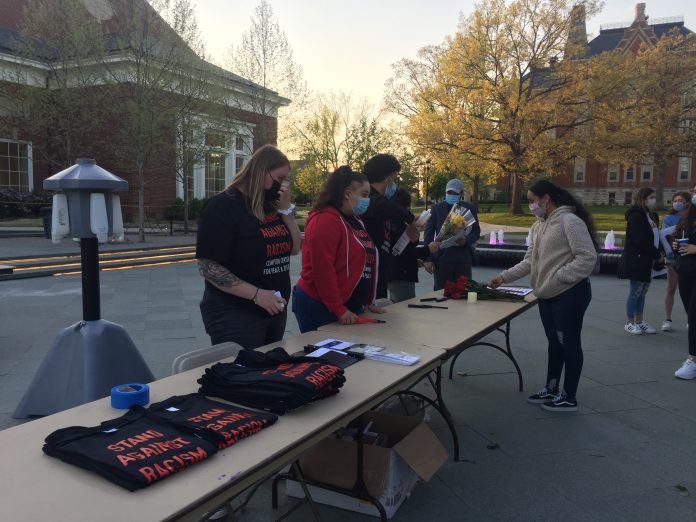
After George Floyd was killed by Minneapolis police on May 25, 2020, a new wave of protests about police brutality and racial injustice rose throughout the United States, many of which were united by the slogan “Black Lives Matter,” which aims to draw attention to the disproportionate killing of Black Americans by police.
In Greencastle, community members and students organized nearly weekly protests at the Putnam County Courthouse over the summer. Though the majority of protests ended in the fall of 2020, the issue of police brutality has remained.
In recent months, a number of events with the potential to impact police brutality in America occured, including the trial of Derek Chauvin, further police shootings and subsequent protests, and the publication of a report on police brutality by an international committee.
The Trial of Derek Chauvin
On March 8, the trial of Derek Chauvin, a Minneapolis police officer accused of killing George Floyd, began. The trial was live streamed on multiple news networks and included 14 days of testimony.
On April 20, the jury convicted Chauvin on all three counts -- one of second-degree murder, one of third-degree murder, and one of second degree manslaughter. The public response was largely positive.
According to CNN, civil rights activist Jesse Jackson remarked, “We still have a lot of work to do. This is a first down, not a touchdown,” sharing a sentiment voiced by multiple activists after the Chauvin trial: that it was a good step but not the end of the issue.
Recent Police Killings
Despite last summer’s protests, police killings have continued, some of which have recently received public attention.
On March 29, Adam Toledo, a 13-year-old Mexican American, was shot and killed by a member of the Chicago Police Department. Though the officer initially claimed Toledo was holding a gun, the released footage from his body camera showed that Toledo had dropped the gun and complied with orders to turn around with his hands up before being shot. Though the officer then requested an ambulance for Toledo, the child did not survive.
On April 11, Daunte Wright, a 20-year-old Black American was fatally shot by a Minneapolis police officer who claimed to have mistaken her gun for her taser while attempting to arrest Wright for an outstanding warrant.
On April 20, Ma’Khia Bryant, a 16-year-old Black American, was shot and killed by police officers who had been called to intervene in a fight between Bryant and two other teenagers. Bryant was armed with a knife. Though some sources claim she made the 911 call that brought police to the scene, neither the call nor an official statement on the matter has been released.
Following these shootings, new protests have started, condemning police for negligence and excessive force, especially when dealing with people of color.
International Report on Police Brutality
George Floyd’s death and the subsequent protests drew international attention to the issue of police brutality against Black people in America.
Members of three organizations—the National Conference of Black Lawyers, the International Association of Democratic Lawyers, and the National Lawyers Guild—formed the International Commission of Inquiry on Systemic Racist Police Violence against People of African Descent in the United States.
The commission was created in the wake of Floyd’s death and included twelve commissioners —“judges, lawyers, professors and experts from Pakistan, South Africa, Japan, India, Nigeria, France, Costa Rica, Barbados, Antigua and Barbuda, the United Kingdom, and Jamaica,” according to the commission’s website.
They examined 44 cases of police brutality against Black Americans and held hearings from January 18 to February 6 of this year. On April 27, the commission officially released the 188 page report of their findings, available in full online. According to their press report, they found the United States “guilty of crimes against humanity and other violations of international law.”
Within its report, the commission listed various findings about police brutality and recommendations for further action, including a call for the United Nations high commissioner for human rights to formally call for demilitarization of the police and an end to racially motivated police brutality.
The Compton Center for Peace and Justice
Following recent police shootings, the Compton Center for Peace and Justice created a number of signs and fliers for the DePauw campus.
According to senior Courtney Boyce, an intern at the center, “The purpose of the Compton Center is to engage with students on campus about important societal issues. It’s pretty much committed to raising awareness about social justice issues in the larger global context.”
Boyce said that interns at the center were able to focus on any issues that they were passionate about. She and junior Isaiah Spears have worked together at the Compton Center to raise awareness about police brutality. Boyce said, “I do it because I’m a sociology student and I focus on recent crimes, so police brutality is something I’ve studied a lot. I’m passionate about it; I think it’s an important issue.”
“As a student of color, I feel like … issues go over people’s heads, and so this is my way -- this is another avenue which I’ve taken to educate the campus and to make it feel closer to home,” Spears said. He explained that he didn’t want students to “just brush it off.” Instead of just hearing about an instance of police brutality on the news, students “see it on campus through the things that we put, for example, our banners or events.”
One of the “main objectives” behind the creation of the sheet signs in Bowman Park and Stewart Plaza was to “just break the DePauw Bubble,” Boyce said. “I feel like DePauw students tend to just forget societal issues because DePauw can be—feel very confined when you’re on campus, so you tend to forget societal issues that may not be seen every day, so we definitely like to bring attention to what’s going on in the world and what’s important.”
In addition to the signs and fliers around campus, Boyce and Spears organized a vigil for the victims of police brutality that went from 8 p.m. to 10 p.m. on Friday, May 7. The vigil included signage naming the 91 Black people who have been killed by police since the start of DePauw’s Spring semester, and the center provided flowers and candles for participants to pay their respects.
“We also give out materials,” Spears said. “So we have, like, pamphlets—when it comes to being confronted by police, what to do and what not to do, protest rights, what to do and what not to do during a protest, things of that nature.” Those pamphlets were also available to participants at the vigil.
Students who wish to participate with the center or provide them feedback can join as interns or reach out to them through their Instagram @comptoncenter_dpu or their email comptoncentersw@depauw.edu.
Interview with a DePauw student protestor
Featured below is the audio and transcript of an interview conducted by Ian Brundige with DePauw student Giovanny Vargas, junior, who attended Black Lives Matter protests in Chicago.
Transcript:
IB: I guess just to start, can you explain a little bit about the protests that you were at most recently?
GV: Yeah. So the protest was on Thursday, because the date.
IB: Yeah -- on Thursday.
GV: [unclear] April 5? I think -- it was the day that the CPD released footage of Adam Toledo. And the-- And it-- Everybody was like, there was a lot of controversy during that ... the time when they were trying to release the footage or not because the media was making false narratives. Families were saying one thing, other people were saying another thing, you know, everybody's saying ... they're giving their opinion on it. But the biggest thing was if his killing was justified, or if they'd, he'd like, you know, he caused the threats of the cop. But the video came out and just showed that he didn't have -- he had a gun running, he threw the gun -- and once he threw the gun, he turned around and complied with the officer, and that's when he was shot. So it was all of a sudden, when once, once, once the video came out, organizers started, you know, posting on social media, started reaching out to people, community organizers, to start things up and honestly, this was started by like two high schoolers in Lane Tech. They just posted something talking about a meetup at Union Park, which is right next to the precinct, the CPD precinct.
IB: Yeah.
GV: So it wasn't, it wasn't as big as I thought it was gonna be, but people did pull up and we did walk-- march to the precinct, and police pulled up, and it was like a good, what, 40-30 of us.
IB: Yeah.
GV: And you know, I would expect police to pull up in, like, regular gear because it's just a small protest. But then people started pulling-- the police pulled up in the right gear, which was confusing, but the protest lasted, like, a good two hours. We went from the precinct, we started marching to the loop, and then we made it to the highway, and we were trying to hit the highway, but that's when they blocked us. Yeah, but…
IB: So, why did you-- why did you decide to go personally?
GV: Honestly, to be honest, I've had like a long… I don’t want to say relationship, but I think I've always been in tune with, like, police shootings or like just…
IB: Yes
GV: Things that have to do with the police in the community, and the-- and their accountability. And I know I remember my first time hearing about these things was Laquan McDonald. Back in, um… I’m blanking on the year, but I was in high school, and the killing happened like four blocks from my house, so it was… it hit home. It hit, like, pretty hard to see wh-, like, [one in?], and that was actually my first protest, going to. And ever since then I've been going to, like, especially protests with police brutality, but I’ve also been involved with like immigration rights and, like you know, gentrification, things like that. But, you know, last summer George Floyd sparked everything back up. And I think that's when a lot of my organization started with community like, posting and other blogging roundtables.
IB: So you're from Chicago, obviously.
GV: Yes.
IB: Why… When you're at DePauw, that's like a very isolated community, what do you think, what is your thinking about these things that are happening, not necessarily on campus, but like you're obviously still going back home to show up…
GV: Yeah, it's -- it's stressful because… [muffled microphone sounds] sorry. But, I saw a quote on Twitter that talks about that. They-- I think he quoted it from somebody, I forget who it was, but he said that they say that college is the solution to our problems. But the problem right now is that college isn't letting us get to the solution. So, I was just like, you know, that's right. Like, all of us right now that are, you know, in college, trying to make it out, and things are going on back home in different cities and especially affecting our races, like, we can't do anything about it, you know? We're stuck here, like upholding-- trying to uphold the standards that the white man wants us to do. Well, we can't really go back home and help people out. So I find it frustrating, [unclear]. Um, you feel like… you feel like you're trapped in a bubble where you know you know what's going on but you still have to comply and get in line. That's how I feel, personally, but I think knowing that you also have people here that understand what you're trying to do here, and understand what's going on back home too is -- it's more of a relief, because we all know our common goal.
IB: Definitely. Obviously there is some political action that takes place on this campus, but what would you say to other students who maybe are less politically involved, about sort of the real world outside of DePauw?
GB: Yeah. Um, I would just say start to listen to stories like this, start to listen to the news a bit more. Yeah. Start to listen to the… What these like, you know, what President Lori Lightfoot said today about the mass shootings… Start to listen to those things. Start to be open to like Google interactions, but also listen to your friends. A lot of the times we want to talk about these things, but we can't find the right people to talk to them about. So, I think sometimes, if you can kind of let your guard down a bit and start to realize the situation that's going on with your identity but also within your group of people that share the same identities, it'd be easier to start to understand each other. Yeah. [muffled] Yeah. Gotcha.
IB: So then, obviously, a lot has been going on in the past few weeks, past month, with shootings in general, and police shootings of people of color. What is sort of the impact that you hope these protests and the work that you've been doing, like, can make?
GV: Yeah, that's a good question because, you know a lot of the times we talk about like, yes these things are super sad and super tragic, but unfortunately, these are the things that have to happen in order for people to, like, wake up and realize what's going on. There needs to be chaos. There needs to be distortion. There needs to be that unease that everything is normal, you know. When I was-- when I was at the protests going back, there was a lot of the protest leaders, they were leading the protests, like screaming out things, and there was other—other-- other people doing like, you know, messing shit up, like, they were going to like grab the trash cans, you know, they throw them on the floor, started throwing things like the construction shit. And some people were like, stop doing that shit -- you know what I mean? They were like, stop messing up my neighborhood. Like some guy came out, and he’s like, you can protest but don't do this thing. But that's what people don’t understand, you know? I mean… we, uh… protesting’s a right of the US. But what's, what's really gonna happen if we just, you know, are standing outside and just screaming and screaming, screaming and screaming, you know? I mean, it isn't until we actually cause some type of fear or some type of –
IB: Disruption?
GV: Disruption. Yeah. And I think that's what a lot of people get-- have to start realizing what protest is and what… and what to a certain degree, the protests need to get, you know, when you're killing people. I think riots are okay. I think they should, should happen, for us, for people to listen.
IB: What is… how… you mentioned the summer and that you went to some protests then and had led protests before, going back to Laquan McDonald-- like how big of a part of your life would you say this is? Like, I don’t know what your major is, or do you plan on, like, doing community organization going forward?
GV: Yeah, honestly, I'm gonna state it on-- No, I don't know what I want to do.
IB: Yeah, no, definitely.
GV: But I think it's something I've definitely always wanted-- want to be involved in, because it has been a personal, personal matter, and it's always something that's always on my mind, you know? Every day I'm leaving my house I always got to understand that the police is not someone I can trust; the police is the enemy, in my world, and in many worlds that I share with. But, um, I think, when I went to, actually, South Africa, my sophomore year, and I realized how similar but different it is in America, and realized how it all has to do with political governance, and governments and things like that, and when you realize that these are the assets and tools that the white man still uses to this day to oppress us. So, um, yeah, I mean, I definitely may want to look into, uh, you know, being in a defense attorney or like lawyers and stuff like that, but I also do have an open mind on like the medical roads and stuff.
IB: Yeah. What is… Going back to the protests a little bit, can you just talk a little bit more about, like, the action before like breaking things and just sort of the general vibe of the protest? What was that like?
GV: You've got all different types of people, all different types of happenings and all different types of emotions going on there. I remember this day, specifically -- it wasn't as big, but there was different types of emotions. Like there was a leader that was just trying to keep people together, and stick together. There was people that were just—just—they were following. And then there was people that came in here with hammers, like gadgets, all like, black-- black out, goggles ready, to like you know, cause destruction. So I feel like, for me, it was kind of nice knowing that there was a little bit of everything, so like we-- you knew people there, that were there for-- down for anything or they're, they’re, they're protected. But honestly, what I think about most is the survival of the police, and how they just keep on shrugging us and keep on trying -- They say that they listen, but they don't really get it.
IB: Yeah. You said it was confusing that, like, riot-- police showed up with riot equipment. What was that moment like when-- when you saw that?
GV: I mean I wasn't surprised, they always do it. I mean, but it was just--
IB: Did you think about leaving at all?
GV: Um, not really, because it will be when… they won't do anything unless we start, you know, violence and stuff like that. But at this point, nah, they just do it for a sense of intimidation. They do it, you know, because it's their performance and what they have to do. And they were also-- I feel like they also got out the riot gear because we were right in front of the precinct. So I guess they were expecting more. And then that guy, one guy with the hammer? He was going at it, too.
IB: So it didn’t escalate to any violence, really?
GV: No, we didn't have enough numbers to do it. I know yesterday, there was, um, there was a lot of demonstrations, but it never got to riots. Honestly, we'll see how it gets -- gets to, now, depending on what happens with the case and stuff. Actually, I didn’t mention it; when we were marching down Randolph, towards the highway, there was times where we were like, like grabbing signs and, like just, throwing like trash cans and stuff like that, but there was this girl that she was grabbing flowers, like-- like the flowers on the side of the road, like this is a road and then this is, like, the division, and she was just ripping them apart right like the flowers, and she gathered them, and instead of, like, instead of-- one intersection, instead of throwing like the trash and stuff like to block the police from like following us, we just do flowers, and it was just a different sight, a different like, you know—
IB: Yeah
GV: It just, it kind of hit because we all just started doing the same thing and we just put flowers instead of just like other things to block us. Well, I know my friend, Mattel, he got a picture of it and he’s posting it, and I know it’s doing well on social media.
IB: Yeah, if you could, if I could--
GV: Yeah, I could, I could,
IB: That’d be awesome—
GV: let him know, yeah, for sure, I can, I can file for you and [unclear] … Did you also-- have you seen the, the mirror that they made, on the site? I’ll show you.
IB: So you mentioned that students organized it, sort of, like, and like the work you've been doing with Pilsen and stuff, so like an organization that you've been working with or like specific other people?
GV: Yeah. Specifically, I've been working with Pilsen Alliance, I started working with them as Pilsen Youth Alliance, I went—I went—I went in with them as an intern. And I did that interning, and now I'm just like, I'm like, like juggling school and all these things I'm just there when I-- when they need me—
IB: When you’re available.
GV: When I’m available, right. But they do a lot. Like, I know the old-- like the older people, or the citizens, like, they like to call themselves citizens, older citizens, like they really fuck shit up, like the ones always going to the court room, always like doing the protests individually and stuff like that. But I know that a lot of other students in college like at Columbia University, all the way in like California and shit, like we be just like, we’re trying to keep something together for the youth that are coming up. And I know that they're getting fundraised a lot more. So they're having paid internships now. So you know, when people have paid internships, they’re going to be like, bet. But this is what they painted on the siding, where he got shot.
IB: Yeah.
GV: Yeah, this... My mom was telling me that yesterday was… Chicago was like silent, you know what I mean? It was like that calm before the storm type shit. She went to the protests and stuff.
IB: Do you go to a lot of protests together?
GV: To be honest with you, no. We – me and my mom – kind of have different views and things sometimes. But I think this is one that we've been able to like connect with. But I think that … we-- we've been together some, but sometimes she does it to herself more because she wants to get her own understanding, instead of you know having people tell her this is what you should be, you know?
IB: Do you think she worries about you?
GV: Yeah man, that's why she didn't want me to go to protests. She's always telling me, like why you going? Why you going? I’m like, ‘cause I have to. And she thinks-- she tells me, she's like, I know ‘cause I did the same thing. ‘Cause she was going with Cesar Chavez was here, she was doing it with my grandmother and her, and her cousins and stuff, but yeah. She's always telling me, like, that's just the biggest worry and stuff, and I understand, ‘cause I mean, when I have, if I have kids one day, I'm gonna be the same way.
IB: Yeah.
GV: Yeah.
IB: So what are some of the other things that the Pilsen Alliance does? You mentioned like courtrooms and …
GV: Yeah, they, uh, they do a lot of social media work, they do a lot of petition work, they're the ones that reach out to local officials like aldermen and representatives in the neighborhoods. What else do they do? They're the ones that be doing like a news broadcast, if the news needs someone to be speaking, and they also need them to face with a lot -- that's one of the biggest things, is they’re the ones that do the protests. They’re actually – Pilsen Alliance – was one of the co-leaders in the protests that happened yesterday. [unclear] So, I don't know, I actually might… I [unclear] to do something new.
IB: Yeah
GV: I know, Courtney, she put a sign out there, right?
IB: Yeah I was gonna ask, what -- if you've like seen those signs, or what you think about--
GV: I didn't see them personally, I saw them on this and I'm like, I mean yeah, I think that… I haven't—I have yet to see campus without a sign this year, and I feel like that's a good thing because we're always reminded of something, something we gotta be thinking about and learning about.
IB: In terms of, sort of, campus and campus climate, do you think that… How do you think that these sorts of problems that are seen in cities and things translate to student life, and specifically the lives of students of color? Or how does it impact your life as a student on this campus?
GV: You know, I don't know, being here at a PWI, I feel like people don't take it as important. I feel like we have, especially professors-- I mean, depending on-- because I have, in my experience, a lot of them have been like, you know, I understand, but also we have work to do. Yeah, and I get that but at the same time it's like, this is the exact same topics we were learning about in the exact same things we're talking about and the issues and the roots and the causes and all these things, but… I don't know-- they may be, they may be right, maybe we should be learning about the basics before we get to these issues because these issues are hard to discuss and argue.
IB: I don't know.
GV: What do you think?
IB: About which part, about--
GV: How do you think that… How do you think that issues going on back home have been directly affecting campus or its student life? Because I feel like sometimes people don’t care, I’m going to be real with you.
IB: Yeah, I can get that. Personally, I feel like there's DePauw, and there's the rest of the world. And it's very easy to sort of focus on DePauw and the things that are happening on campus, and ignore the rest of the world, which feels nice, like it feels good to do that for a while, but the world’s still there and like, shit’s still happening, that… Yeah, so I feel like it's difficult to live with both of those things. Honestly,
GV: I feel I’m trying to get this over with.
IB: Very much so. Very much so.
GV: We have a month left of school.
IB: We do.
GV: That's it. [unclear]
IB: Anything else? We can keep talking, but I think that's all I need for the interview, unless there’s anything else you want to add.
GV: It's pretty much it. Thank you.

